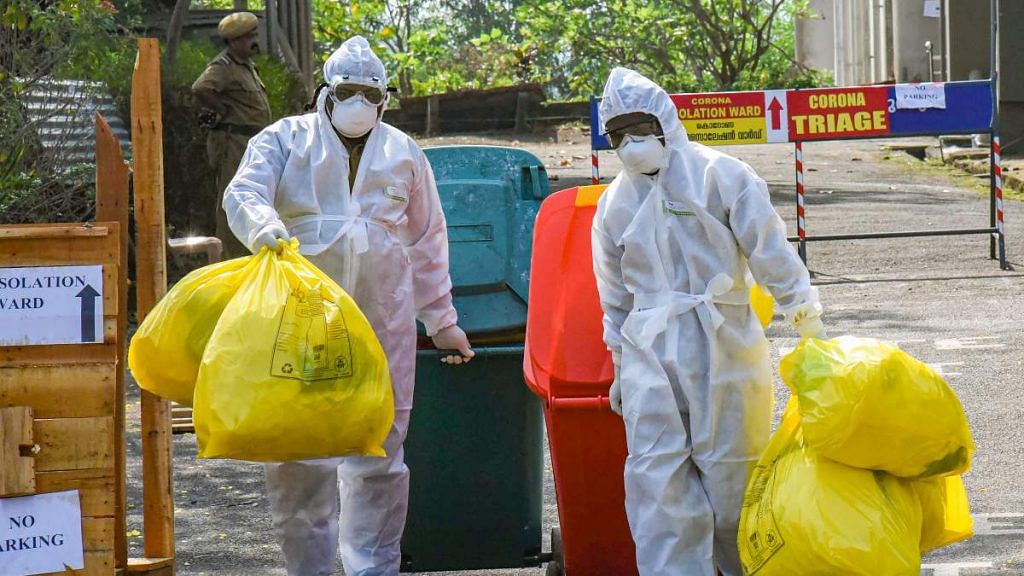Bengaluru: There is a growing risk of newer zoonotic outbreaks, like the Covid-19, being caused by unsustainable human activity, a new special UN zoonoses report released by United Nations Environment Programme (UNEP) warns.
The report is a scientific assessment of trends of transmission and growth of diseases jumping from animals to humans, also called zoonotic diseases.
Such transmissions will become common if countries do not take effective steps to curb them, said the report which was released in Nairobi Monday.
The UNEP report points out that the world’s expanding population is putting humans increasingly at risk for newer outbreaks as humans and animals are being pushed closer and closer together.
Titled ‘Preventing the next pandemic — Zoonotic diseases and how to break the chain of transmission’, the scientific assessment was performed and published in collaboration with International Livestock Research Institute (ILRI) in Africa.
“People look back to the influenza pandemic of 1918–1919 and think that such disease outbreaks only happen once in a century,” said Maarten Kappelle, the head of scientific assessments at UNEP. “But that’s no longer true. If we don’t restore the balance between the natural world and the human one, these outbreaks will become increasingly prevalent,” he said.
The report, released in Nairobi Monday, discusses Covid-19 in the context of it being the latest in a growing list of zoonotic outbreaks, the previous being SARS, MERS, HIV and Ebola among others.
“Covid-19 is one of the worst zoonotic diseases, but it is not the first,” said Inger Andersen, an Under-Secretary-General at the UN and Executive Director of UNEP. “Ebola, SARS, MERS, HIV, Lyme disease, Rift Valley fever and Lassa fever preceded it. In the last century, we have seen at least six major outbreaks of novel coronaviruses.”
Also read: Delhi and Mumbai’s high Covid tally linked to severe air pollution levels, say experts
Human activity fueling zoonotic diseases
Zoonotic diseases have infected humans throughout history. Sixty per cent of all known infectious diseases, including the flu, HIV, tuberculosis, common cold, the plague, and 75 per cent of emerging infectious diseases, such as Ebola, SARS, MERS, Zika fever and Covid-19, are zoonotic in nature.
It is estimated that two million people in low- and middle-income countries die every year from zoonotic diseases that can be endemic in some populations, such as bovine tuberculosis, anthrax and Japanese encephalitis. These diseases persist in countries that have a high dependence on livestock and/or proximity to wildlife.
Growth in humanity and its activity is largely to blame, said Anderson.
“Meat production has increased by 260 per cent in 50 years. We have intensified agriculture, expanded infrastructure and extracted resources at the expense of our wild spaces. Dams, irrigation and factory farms are linked to 25 per cent of infectious diseases in humans. Travel, transport and food supply chains have erased borders and distances. Climate change has contributed to the spread of pathogens.”
She added that we were even warned that the ongoing pandemic was simply a matter of time; it was a question of when, and not if, Anderson said, describing the lack of healthcare system preparation to tackle the failure.
The report identifies seven trends that seem to be driving the increasing emergence of zoonotic diseases. These include increasing human demand for animal protein, unsustainable agricultural intensification, increased use and exploitation of wildlife, unsustainable utilisation of natural resources accelerated by urbanisation, land use change and extractive industries, increased travel and transportation, changes in food supply and the ongoing climate crisis.
What can nations do?
The authors put forth 10 steps that nations can adopt immediately to lower the risk of future outbreaks. These include raising awareness of health and disease risks and prevention, improving health governance, expanding research into zoonotic diseases, ensuring financial accounting of social impacts of diseases, monitoring and regulating food systems by risk, phase out unsustainable agricultural practices, implement strong biosecurity measures, strengthen animal health, and ensure health stakeholders incorporate environmental effects into health services.
The report proposes a One Health approach, which was first put forth in 2017, which aims to unite medical, veterinary, and environmental expertise to help governments, businesses, and civil society to “achieve enduring health for people, animals and environments alike.”
“The science is clear that if we keep exploiting wildlife and destroying our ecosystems, then we can expect to see a steady stream of these diseases jumping from animals to humans in the years ahead,” stated Andersen.
Covid-19 has currently infected over 11 million people worldwide with over 500,000 people having succumbed to the disease already.
Also read: More floods, severe heatwaves: Govt predicts climate change impact on India this century
